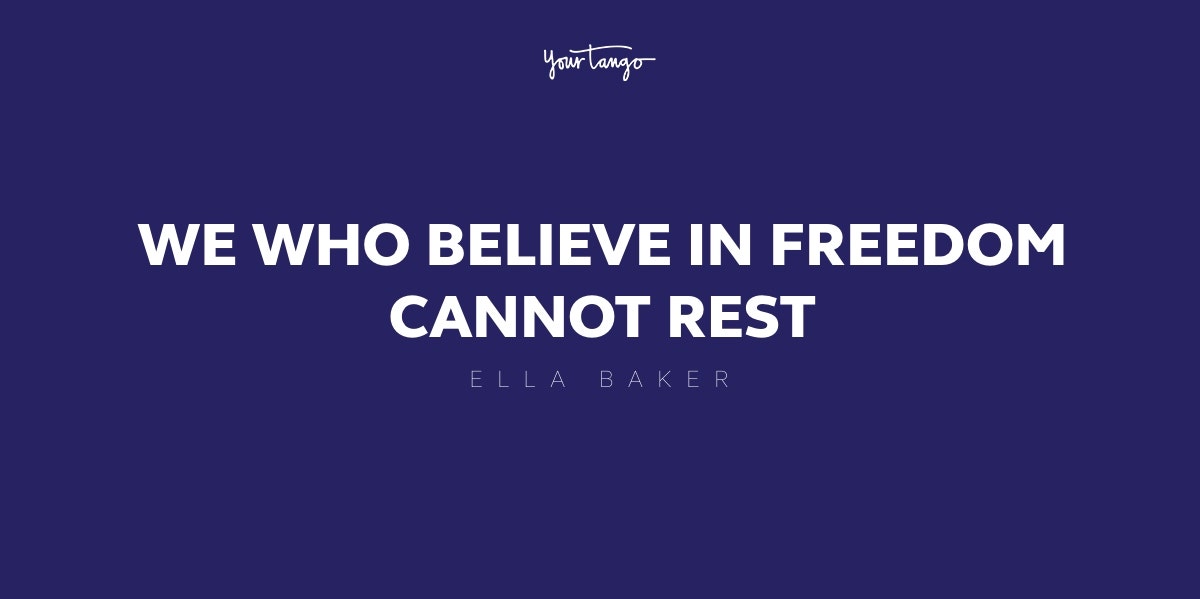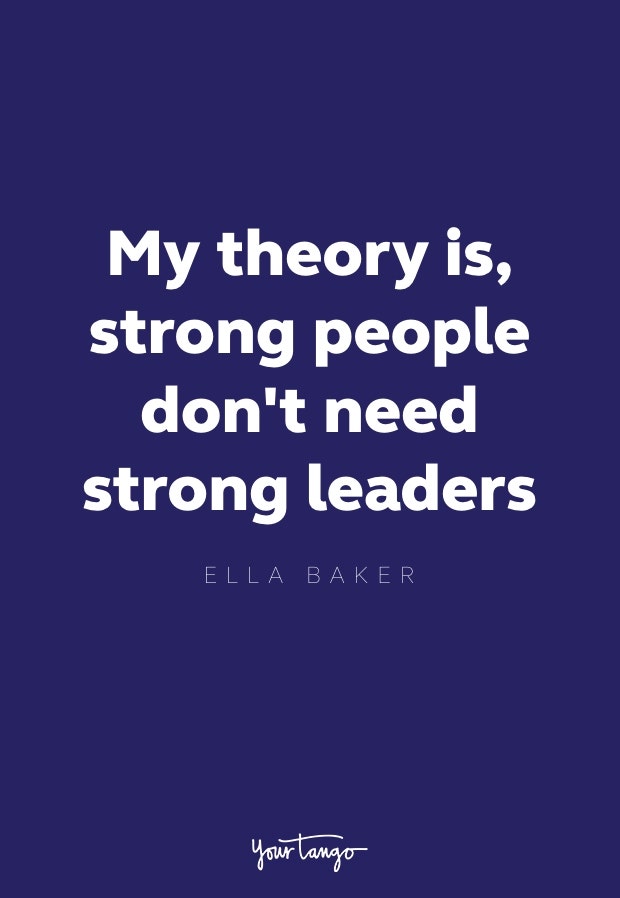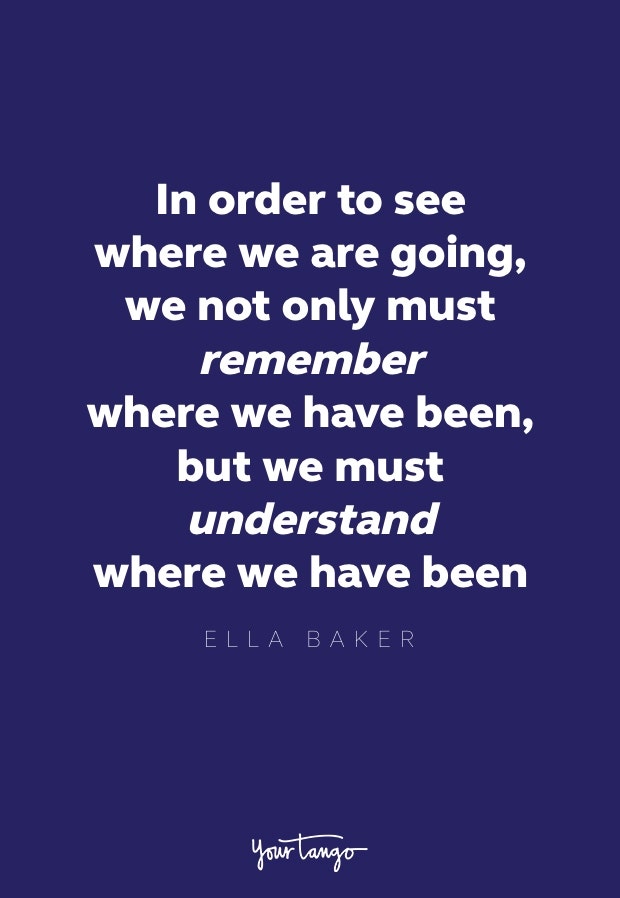25 Motivational Ella Baker Quotes To Inspire Activism
Ella Baker is known as the "Mother of the Civil Rights Movement."

Ella Baker, a prominent civil rights activist, worked alongside leaders such as W.E.B Du Bois, Thurgood Marshall, A. Phillip Randolph, and Martin Luther King. The most powerful Ella Baker quotes show why her behind-the-scenes, yet influential leadership solidified the legacy of the Civil Rights Movement.
Baker believed in racial and economic equality. The Ella Baker Center for Human Rights, an organization that aims to break the cycle of incarceration and poverty, states that “we continue [Baker’s] legacy when we say books not bars, jobs not jails and healthcare not handcuffs.”
The Ella Baker Center is one of the many organizations that were inspired by Baker’s work.
Her teachings inspired many prominent civil rights leaders, and her criticisms surrounding voting rights, incarceration, and education laid the foundation for protest-rhetoric today.
Here are 25 Motivational Ella Baker Quotes to inspire activism in yourself:
1. “Until the killing of black men, black mothers' sons, becomes as important to the rest of the country as the killing of a white mother's son, we who believe in freedom cannot rest until this happens.”
2. “My theory is, strong people don't need strong leaders.”

3. “Give light and people will find the way.”
4. “Oppressed people, whatever their level of formal education, have the ability to understand and interpret the world around them, to see the world for what it is, and move to transform it.”
5. “In order for us as poor and oppressed people to become part of a society that is meaningful, the system under which we now exist has to be radically changed... It means facing a system that does not lend its self to your needs and devising means by which you change that system.”
6. “One of the things that has to be faced is the process of waiting to change the system, how much we have got to do to find out who we are, where we have come from and where we are going.”
7. “We who believe in freedom cannot rest.”
8. “Remember, we are not fighting for the freedom of the Negro alone, but for the freedom of the human spirit a larger freedom that encompasses all mankind.”
9. “I didn't break the rules, but I challenged the rules.”
10. “The major job was getting people to understand that they had something within their power that they could use, and it could only be used if they understood what was happening and how group action could counter violence.”
11. "People cannot be free until there is enough work in this land to give everybody a job."
12. “Singing alone is not enough; we need schools and learning.”
13. “I have always felt it was a handicap for oppressed peoples to depend so largely upon a leader, because unfortunately in our culture, the charismatic leader usually becomes a leader because he has found a spot in the public limelight.”
14. “Even if segregation is gone, we will still need to be free; we will still have to see that everyone has a job. Even if we can all vote, but if people are still hungry, we will not be free.”
15. “In order to see where we are going, we not only must remember where we have been, but we must understand where we have been.”

16. “The struggle is eternal. The tribe increases. Somebody else carries on.”
17. “This may only be a dream of mine, but I think it can be made real.”
18. “I have always thought that what is needed is the development of people who are interested not in being leaders as much as in developing leadership in others.”
19. “There is also the danger in our culture that because a person is called upon to give public statements and is acclaimed by the establishment, such a person gets to the point of believing that he is the movement.”
20. “I began to feel that my greatest sense of success would raise the level of masses of people, rather than the individual being accepted by the Establishment. So, this kind of personal thinking, combined with, say, even the little bit more radical thinking – because at one time the pacifist movement was a very radical concept.”
21. “I had known, number one, that there would never be any role for me in the leadership capacity with SCLC. Why? First, I’m a woman. Also, I’m not a minister. And second, I am a person that feels that I have to maintain some degree of personal integrity and be my own barometer of what is important and what is not.”
22. “Because our children had had the privilege of growing up where they’d raised a lot of food. They were never hungry. They could share their food with people. And so, you share your lives with people.”
23. “I came out of a family background that involved itself with people.”
24. I think personally, I've always felt that the Association [NAACP] got itself hung-up in what I call its legal successes. Having had so many outstanding legal successes, it definitely seemed to have oriented its thinking in the direction that the way to achieve was through the courts.
25. “Awake youth of the land and accept this noble challenge of salvaging the strong ship of civilization by the anchors of right, justice, and love.”
Who is Ella Baker?
Born in Norfolk Virginia, Baker began her involvement with the NAACP in 1940. While she’s helped organize a number of different movements, she is most known for her work regarding the nationwide sit-ins.
Baker saw the potential of young students and gave them the tools needed to forward effective activism.
After the Greensboro sit-ins, Baker founded The Student Nonviolent Coordinating Committee (SNCC), who became the “foremost advocates for human rights in the country,” according to the Ella Baker Center for Human Rights.
The SNCC was in charge of organizing sit-ins, voter registration drives in black communities, as well as the historic 1961 Freedom Rides, in which activists rode interstate buses to protest segregationist policies in the South.
Baker’s quiet work ensured the success of most civil rights era policies we know today. She extended voting rights for black communities, worked with prominent leaders to end Jim Crow laws in the South, and continuously fought for equal rights to education.
Ella Baker's Legacy
Baker believed that voting was the one key to freedom. She dedicated her life to ensuring structural change, while also pushing back against sexism and establishment assimilation within the civil rights movement.
While she was never really interested in the spotlight, her legacy continues to inspire generations of activists: from Stokely Carmichael to Arthur Kinoy, to Angela Davis.
Jessica Xing is a writer who covers LGBT issues, books, culture, and media.

